dksr in practice
Do you need data-based solutions for your municipality? We help you find and implement them.
In doing so, we build on the strong wealth of experience from our previous projects and implementations.
Below you will find reports from our previous clients: Click on the tiles to get better insights! In addition, you will find a list of most of the projects that are currently being carried out with DKSR as a partner or that we have already successfully completed.
What our customers say
Recent Projects

Building intelligent positive energy districts for climate neutral cities and communities (BIPED)
Funded by “Horizon Europe” (Grant ID: 101139060)
Project partners: Technical University of Denmark (DTU); City of Aarhus; Center Denmark (CDK); DKSR; KPMG; Open Agile Smart Cities (OASC); Virtual City Systems (VCS); Austrian Institute of Technology (AIT); University of West Bohemia; Roadt Twin; InnoConnect; Utrisque; Digital Resilience Institute
Project objective: The BIPED project aims to support the development of smart and climate-positive districts (Positive Energy Districts (PEDs)) with the help of a local digital twin to support the development of CO2-neutral cities. Urban measures towards decarbonization are to be driven by data, e.g. initially tested virtually using AI-based data models. However, BIPED also considers the real space through strong community involvement on site.
Our contribution: Together with 12 other project partners, we are developing a digital twin for Brabrand, a district of Aarhus, the second largest city in Denmark. DKSR is responsible for the architecture of the twin, with DKSR-OUP acting as the data hub. Data sources from the domains of energy and mobility, cross-sectoral and soft data are connected via the OUP. The consortium partners will develop AI-based data models from the areas of mobility, energy and also for cross-sector data and integrate them into the BIPED twin. With this comprehensive data set, BIPED expands the typical approach for Positive Energy Districts, making BIPED more meaningful.

Twin for Resilience (T4R) - Resilient Territorial Planning with Local Digital Twins
Funded by Interreg North-West Europe
Project partners: City of Utrecht (project coordination), City of Amsterdam, Dublin City Council, City of Rennes, City of Brussels, Intermunicipal Association Leiedal, Municipality of Schuttrange, Flanders Environment Agengy, Luxembourg Insitute of Science and Technology, K8, Digital Flanders, University of the Arts Utrecht and ALL DIGITAL
Project objective: T4R aims to facilitate the introduction of a Local Digital Twin (LDT) for urban and regional planning in cities of all sizes. The aim is to identify opportunities and limitations in the use of digital twins by different stakeholders (civil servants, spatial planning companies and citizens) based on 8 pilot cities. Frameworks for digital twins in terms of technical design, governance, ethics, inclusion and democratization and education will be created and training will be offered to interested cities. Beyond the 8 pilot cities, the aim is to create added value for cities and regions throughout Europe.
Our service: DKSR brings expertise in digital twins, data analysis and urban data use to the EU project – including from the “TwinBy” project for the Bavarian State Ministry and the “Business Case Analysis Digital Twin Vienna”. In particular, DKSR is taking over the management of work package 2 (Resilient Pilot Actions) in the project. In this context, DKSR accompanies and supports the 8 pilot cities in the implementation of the digital twins in the areas of energy, mobility, environment and integrated territorial planning in close cooperation with the corresponding project managers of the individual local digital twins. Ultimately, the solutions are to be scaled up so that other cities can also benefit from them.

Development and implementation of a digital center strategy
On behalf of the city of Troisdorf
Project objective: As part of a federal funding program “Sustainable inner cities and centers”, the measure “Development and implementation of a digital center strategy” is intended to enhance Troisdorf’s city center and district centers through the use and application of data. The DKSR data platform will be used together with the HeiDi app for this purpose: urban data will be brought together via the data platform, analyzed and processed in the app for citizens to accompany their everyday lives and add value. In citizen participation processes, mobility and climate adaptation were identified as the most relevant fields of action, which will be tackled together with use cases in other areas over the next two years.
Our service: DKSR links various data from the city of Troisdorf to the urban data platform in order to uncover potential uses for the city and its citizens. We support the city in an advisory capacity throughout the entire center upgrading process. Innovative functions are being added to HeiDi app for Troisdorf to improve digital life in the city for citizens. To this end, DKSR is carrying out various data analyses.

Open Data-Platform for the state of Bavaria
On behalf of Byte – Bayrische Agentur für Digitales GmbH
In cooperation with piveau (Fraunhofer FOKUS)
Project goal: The goal of the Free State of Bavaria is to create a platform solution to transparently use Open Data for innovative use cases.
Our service: We implement a complete Open Data platform via the data management system piveau of Fraunhofer FOKUS. This also includes an intuitive and user-friendly front-end design adapted to the state of Bavaria.


ASCEND: Accelerate PoSitive Clean ENergy Districts
funded by Horizon Europe
in cooperation with various European project partners
Project Objective: The objective of the project is the implementation of two climate positive districts (Positive Clean Energy Districts) in the lighthouse cities (LH) Lyon and Munich. For this purpose, transferable solution packages are to be developed, adopted in other cities of the project and the applications made available for dissemination.
Our service: The DKSR Open Urban Data Platform is used to monitor the key performance indicators of ASCEND. A reference model for building a local energy community is also being developed through the platform. DKSR is also involved, among other things, in defining the necessary digital foundations for PCEDs as well as a model to enable their scaling to other cities based on open standards, interoperability and data sovereignty. More information here.


BuildingTrust - Trustee modules for building data
On behalf of Federal Ministry of Education and Research (BMBF)
Project partners: TU Dortmund University, Fraunhofer Institute for Software and Systems Engineering (ISST), Leibniz Institute of Ecological Urban and Regional Development (IOER), funded by the BMBF
Project Objective: BuildingTrust is the follow-up project to KomDatIS. It is developing a holistic concept for a data trustee for building data. The aim is to exchange data between interested parties from the building sector and thus break down data silos. The central stakeholder here is the building owner and the central service is the digital building file for them. The data trustee will be developed as a synergetic and modular system in which every data provider is also a data consumer and receives added value or an incentive for providing data. Trust in the use of data trustees will be strengthened. Two testbeds will be used to validate the concept. In the end, various financing and business models for data trustees in the building sector will be validated and a prototype application implemented.
Our service: DKSR develops the overall concept of the building data trustee. The overall concept is developed based on the findings on users, data products, data models and trust levels. It also carries out one of the two testbeds. For this purpose, the data trust prototype based on the IDS Eclipse components, which was developed in the predecessor project KomDatIS, is used and extended. User flows and mock-ups are derived from the identified data products and a user interface is designed.


CLIMABOROUGH
funded by Horizon Europe
Project Purpose: CLIMABOROUGH is an innovation project to test digital climate services in 12 European cities undergoing environmental and digital transformation. The project aims to improve traditional urban planning approaches through data-driven decision-making, including climate services for transition and cross-city and cross-country co-creation, as well as leveraging public procurement for innovation.
Our service: The DKSR Open Urban Data Platform will serve as the basis for climate data monitoring in the project and will be linked to other platforms in the project to provide climate data. The co-design of the technology and interaction of the municipal actors within the project will be based on the Urban Data Community and developed solutions will be listed on the web portal DKSR.square, which also serves as an exchange platform.


Consulting & support to the International Smart Cities Network (ISCN), Berlin, of GIZ.
On behalf of the International Smart Cities Network (ISCN) of the Deutsche Gesellschaft für Internationale Zusammenarbeit (GIZ) GmbH.
Project Goal: The ISCN currently consists of the core member countries Brazil, Mexico, Peru, India and Germany. Partner countries have the opportunity to share expertise and experiences in the field of smart cities through the network in various formats that DKSR is helping to support as part of the project. The aim is to jointly shape the digital transformation of cities in terms of sustainable and integrated urban development.
Our service: DKSR supports the ISCN in terms of content and organization in the preparation, implementation and follow-up of events of the network. This includes trend scouting, coordination of speakers, preparation of the agenda, moderation and follow-up of the events as well as management of the LinkedIn channel.

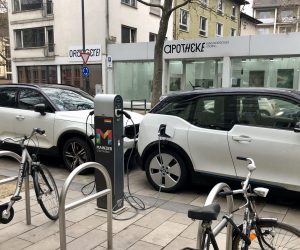
Open Source Urban Data Platform
On behalf of the Mainzer Stadtwerke AG subcontracted by the city of Mainz
The project: In the Open Source Urban Data Platform project with Mainzer Stadtwerke AG (MSW), we support the MSW team with our consulting services and the use of the DKSR Open Urban Data Platform in the development and application of digital solutions for the city of Mainz.
Our service: Together with MSW, we are developing several use cases as a proof of concept for the DKSR Open Urban Platform. The first of these is already in place: by linking data from Innogy charging stations and SCS ground sensors in Mainz, we want to optimize e-charging station occupancy in the city. Charging point occupancy and charging times are monitored; in the event of incorrect use, for example, a report is sent directly to the public order office. Other use cases, such as the monitoring of heavy rainfall events and the observation of parking space occupancy in real time using sensors in vehicles, are being planned.


Digitization strategy for Landkreis Meißen
On behalf of the Landkreis Meißen
Project lead: atene KOM GmbH
Project objective: Meißen County is conducting a special project as part of the “Smarte.Land.Regionen” model project of the German Federal Ministry of Food and Agriculture (BMEL): In the course of this, a digitization strategy is being launched to form the basis for the intelligent and sustainable digital development of the region.
Our service: Together with atene KOM, we support the customer in implementing the participation and process phase. For this purpose, we design and implement expert workshops together with the customer, especially in the topic area of “administration”. We advise the representatives of the district on the topics of open data and open source as well as on implementation options for technical solutions, especially GIS, and coordinate the exchange with the urban data community.


Harmonization of Asset Data in a Municipal Infrastructure Twin for the Efficient Design of Planning and Construction Measures (KomIT)
Funded by the mFUND innovation initiative of the Federal Ministry of Digital Affairs & Transport (BMDV)
In cooperation with regio iT gesellschaft für informationstechnologie mbH (network coordinator), the city of Aachen, Regionetz GmbH, Aachen, umlaut solutions GmbH, Aachen, cityscaper GmbH, Aachen and RWTH Aachen University (ISAC)
Project objective: Municipal asset data are to be merged and harmonized in a municipal infrastructure twin. This will provide all parties involved with daily updated and reliable access to necessary data. For the first time, a central working data platform will be created, with the help of which planning and construction measures can be designed efficiently. Based on this, concrete applications will be piloted and a data room for transferability will be designed.
Our service: DKSR supports the architecture of the data room & digital twin as well as the development of an open data platform. Asset data such as utilities, streets and street furniture will be merged in the DKSR Open Urban Data Platform and a common data space.

Municipal Data Utilities (KDW)
Supported by mFund
In cooperation with Mainzer Stadtwerke AG, Fraunhofer FOKUS and PMG Parken in Mainz GmbH
Project objective: Within the framework of the funded project, an intra- and inter-municipal platform will be developed on the basis of a use case in the field of mobility, which enables the technically, legally and organizationally secure exchange of data from different organizations and its provision to municipal actors. By focusing on the municipal level, the project forms the low-threshold connecting point for the use of larger, national platforms and is to be made available beyond the mobility sector for the networked use of urban data in all urban areas.
Our service: DKSR is leading and coordinating the grant project. The proof of concept is developed and implemented via the DKSR Open Urban Data Platform. In addition, we are responsible for the public project communication with all events and publications.
Completed projects


Municipal data trustees - integration of citizens and companies for the sovereign exchange of data in the smart city (KomDatIS)
On behalf of the Federal Ministry of Education and Research (BMBF)
Project partners: TU Dortmund University, Fraunhofer Institute for Software and Systems Engineering (ISST), funded by the BMBF
Project objective: In the KomDatIS project, DKSR is working with the Technical University of Dortmund and the Fraunhofer Institute for Software and Systems Engineering (ISST) to develop a concept for the trustee-based processing of data exchange between private individuals, companies and public institutions in the municipal environment. The building data use case was carried out in cooperation with the City of Leipzig. The aim is to develop a prototype data trustee that focuses on the data exchange of house and apartment owners as well as public building data.
Our services: DKSR is involved in the concept and use case development. For the use case, DKSR is setting up a pilot instance of the OUP, with which the new data trust functions are constantly checked and tested. The technical reference architecture is Gaia-X and the components of the International Data Space (Eclipse), which was developed by the Fraunhofer Gesellschaft and is intended to provide the basis for a secure and cross-domain data space.

TwinBy - Digital Twins for Bavaria
On behalf of the Bavarian State Ministry for Digital Affairs (StMD) and Bayern Innovativ GmbH.
In cooperation with ateneKOM GmbH and Urban Software Institute GmbH
Project objective: With the TwinBy project, the Bavarian State Ministry for Digital Affairs (StMD) supports Bavarian municipalities in implementing digital models of objects and processes (digital twins) using their own data. The municipalities are to be enabled to work with and further develop their own digital twins.
Our services: DKSR provides consulting, coaching, and technical assistance and support work to the funded municipalities and alliances in the implementation of their respective use cases. The Smart District Data Infrastructure (SDDI) framework is used for this purpose. At the end of the project, the aim is to enable users in the municipalities to experience the added value of their own digital twin.

Discovery Package Urban Data
On behalf of the city of Oberhausen
Project goal: Within a limited period of six months, the city of Oberhausen gained entry and insight into the logic and possibilities of the DKSR Urban Data Platform. The main goal was to create a general understanding of the functionality of an urban data platform and to show how the use of urban data can add value to the city.
Our service: As part of the Urban Data Discovery Package, DKSR connected city mobility data to the Urban Data Platform in order to uncover potential uses. Several workshops were held with the Smart City team and the city’s transportation team to identify appropriate use cases. The data was then visualized on a dashboard and analyzed as examples.

Consulting: Service description Open Data Hub
On behalf of the district of Gießen
Project objective: The district of Giessen is a federally funded “Smart City Model Project”. The creation of a digitization strategy for the district – together with stakeholders from the region – is therefore a top priority. In the future, part of the corresponding infrastructure will also be an Open Data Hub, which will be the basis for a cross-sectional project to bring together data from different areas of the region and thus take measures and create added value.
Our service: DKSR advises the district of Giessen to develop a needs-based performance specification for the procurement of the Open Data Hub. For this purpose, we conduct several virtual workshops to include all important preliminary conceptual considerations and prepare the results for the client. Technical specifications and the corresponding financial and expertise requirements are also developed and provided. At the end of the consulting process, a service description of the Open Data Hub is prepared based on the requirements of all important stakeholders in the district.

Data strategy for Berlin's municipal cleaning service (BSR)
On behalf of the Berliner Stadtreinigung
Project partner: Fraunhofer Institute for Industrial Engineering
Project objective: The objective of DKSR’s consulting project for Berliner Stadtreinigung was the development of a cross-departmental BSR data strategy. BSR employees were involved in the process: in the creation of a uniform understanding of the actual and target state of data handling as well as in the design of suitable data governance and data management for the city cleaning department.
Our service: Together with Fraunhofer IAO, DKSR led the data strategy development process for the client. This included the as-is analysis of data handling with the help of interviews, the identification of possible data-based use cases within BSR, the derivation of an IT architecture as well as the formulation of recommendations for action and the creation of a roadmap for efficient data organization.


Model Project Smart City DATA:SPACE:FREIBURG
On behalf of the city of Freiburg
Project partners: Bechtle and Virtual City Systems
Project goal: With the DATEN:RAUM:FREIBURG project, the city of Freiburg wants to make data from a wide variety of sources available in a bundled form in order to evaluate them and enable data-based applications. Know-How from different sectors will be brought together and thus be available e.g. for simulations. The DATEN:RAUM is thus intended to help with integrated urban development. For the first time, the city is taking advantage of the possibility of innovative contracting: The participating companies will deliver partial results step by step, instead of being given concrete final results.
Our service: Together with the project partners Bechtle and Virtual City Systems, we are developing a prototype for the city of Freiburg to improve mobility control and traffic safety. By merging and evaluating various traffic data, this prototype enables conclusions to be drawn and measures to be taken for a people-friendly traffic environment.

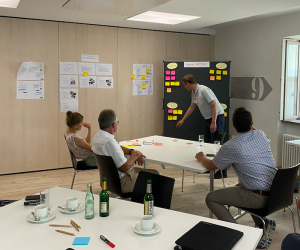
Smart City Strategy Development and Participation Formats in Ilzer Land
On behalf of the municipality of Ringelai and ILE Ilzer Land e.V.
Project partners: atene KOM GmbH and Polidia
Project Objective: The objective of the project is to develop an individual Smart City strategy for the ILE Ilzer Land association of municipalities in order to support a strategic, integrated, sustainable and public welfare-oriented regional development. The concept is developed in interactive cooperation with the communities, experts and the population.
Our service: Together with atene KOM GmbH and Polidia, DKSR supports the ILE Ilzer Land with its data competence in an advisory capacity in the preparation, conceptual design, development and implementation of its smart city strategy. In addition, we advise the AG in the conception, organization, implementation and follow-up of various event formats and participate in the participation and consultation processes.

Proof of Concept for the Graz data ecosystem
On behalf of Holding Graz
Project Objective: Holding Graz plans to build and operate an urban data platform for better aggregation and management of various data from different systems and databases. In a proof of concept (PoC), mobility data is to be connected, standardized and processed for different purposes by a data platform. This is intended to create the basis for a scalable, modular data ecosystem with which the holding company can leverage efficiency potential for the city through holistic data management and tap into new digital business potential.
Our service: As part of the project, DKSR is implementing a proof of concept via the Open Urban Data Platform for the envisaged data ecosystem in Graz. Together with the client, we take stock of the existing (data) infrastructure, connect data sources as needed and visualize the data in a dashboard. We also design data reports in which the most important information about data processed via the platform is provided at a flexible query frequency.

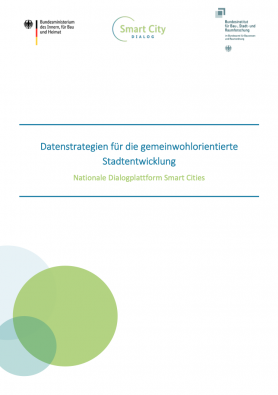
Studie: "Data Strategies for a Common Good-Oriented Urban Development"
On behalf of the International Smart Cities Network (ISCN) of the Deutsche Gesellschaft für Internationale Zusammenarbeit (GIZ) GmbH.
Project Goal: The goal of the International Smart City Network (ISCN) and the Deutsche Gesellschaft für Internationale Zusammenarbeit (GIZ) was to provide international technical know-how and best practices from the development and implementation of data strategies with the study. In addition, the organizations will use the study in their consulting services for the German Federal Ministry of the Interior and Local Government (BMI) and in partner countries.
Our service: For the study, we identified ten best practices for data strategies and data-driven policies in different cities around the world, including Sao Paolo, Melbourne, Hamburg, Montreal, and Seoul, and conducted structured interviews after researching the smart city experts and contact persons there. The result was an overview of the most important international debates on data strategies, on the basis of which we were able to formulate recommendations for action for cities and regions.


Use Case Development for the "Urban Regional Cockpit" Kärnten
On behalf of the association Zentralraum Kärnten+ with the cities of Klagenfurt, St. Veit and Villach (AT).
Project goal: The goal of the project with the cities of Klagenfurt, St. Veit and Villach of the Central Area of Carinthia is the development of two use cases: one for an intelligent parking guidance system to reduce travel times and emissions, one for the analysis of movement data, for example to observe commuter flows and to be able to design them more sustainably.
Our service: As DKSR, we support the customers with our consulting services in the development of the use cases. For this purpose, a one-day workshop was held on site with the municipal employees. In order to make the data more tangible in visualized form, we provide the customers with a dashboard for display via a test instance of the DKSR platform.

Platform migration and use case design
On behalf of Stadtwerke Karlsruhe
Project goal: The goal of the project was to move the data platform of Stadtwerke Karlsruhe from the running ui! systems to the DKSR Open Urban Data Platform as well as the definition of a suitable data-based use case for the city involving the city of Karlsruhe.
Our service: As DKSR, we migrated the Stadtwerke’s running systems to the DKSR OUP. Together with the customer, we analyzed the potential of different use cases for a possible implementation, based on the challenges of the city, and together we developed a concept for the selected use case “From Friedrichsplatz to smart Friedrichs-Oase”, which includes the planning of Karlsruhe’s Friedrichsplatz as a network node for citizens* and smart city.

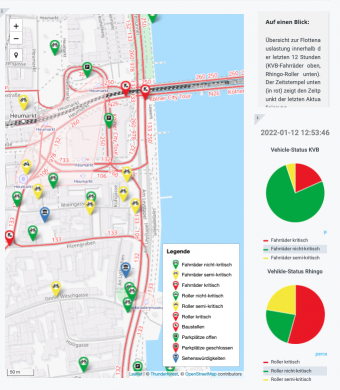
KUDOS - Dashboard for Micromobility
On behalf of the City of Cologne
Project Goal: As part of the project “KUDOS – Dashboard for Micromobility”, the goal of the Cologne Urban Data Ecosystem KUDOS was to gain new insights into the use of data from data sources of the partners Kölner Verkehr-Betriebe AG (KVB), RheinEnergie AG and the City of Cologne by developing and implementing a concrete use case, thereby developing a better understanding of data platforms and their potential for the city.
Our achievement: Using the DKSR Open Urban Data Platform, we were able to successfully link data from KVB (sharing bikes, weather stations, stops) with that of RheinEnergie (electric scooters) and the City of Cologne (landmarks, events, parking garages, construction sites). We then evaluated the sharing services using a metric based on their positioning in the city as well as their standing time.

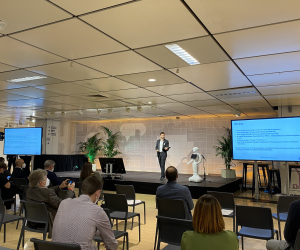
Ideation Challenge Mönchengladbach
On behalf of the city of Mönchengladbach
Project goal: The goal of the Ideation Challenge Mönchengladbach was to conduct an idea competition for the implementation of a direct award with the winner as part of the innovative municipal award strategy. In this way, innovative collaborations were to be promoted in order to use data-based solutions of young (local) companies via the municipal data platform in a meaningful way.
Our service: We designed and implemented the Ideation Challenge in close collaboration with the client. In addition to the design of the structure, the process and the participation and evaluation criteria, the concept also included the supervision of participants and the organizational support of the competition. We also developed communication measures to accompany the competition in collaboration with Mönchengladbach and implemented them together with other multipliers from our network.

"Backend of Backends": Requirement specification for data transmission, processing and storage - "Deutschlandnetz" reporting requirement
On behalf of NOW GmbH
Project partners: Fraunhofer Institute for Industrial Engineering
Project goal: As part of the “Deutschlandnetz” project, the operators of approximately 8,800 HPC charging points tendered by the Federal Ministry of Digital Affairs and Transport will be required to send automated monthly reports and near-real-time data to the National Charging Infrastructure Control Center. A new IT infrastructure is needed to transmit, process and store the data.
Our service: In order to create the basis for the development of the IT infrastructure for data transmission (“backend of backends” ) for the reporting obligation at the “Deutschlandnetz”, DKSR is working with Fraunhofer IAO to develop a concept of technical implementation options for the transmission, processing and storage of the data.

Market analysis for KOMUNIS, the municipal information system of the city of Stuttgart
on behalf of the state capital Stuttgart
Project objective: The information system KOMUNIS of the state capital Stuttgart is to be adapted to current needs and contemporary functionalities. Representations and services are to be made more citizen-friendly and the system architecture is to be adapted.
Our service: Based on the requirements of the Statistical Office, DKSR developed scenarios of what a future solution could look like. After the creation of a needs-oriented requirements catalog, a pre-selection of system solutions was made. For this purpose, a market review was conducted. At the end, solutions were evaluated and selected, from which recommendations for action were derived.

Market analysis of a modular data management system for data exchange, integration and evaluation
In cooperation with Fraunhofer FOKUS / on behalf of the city of Stuttgart.
Project objective: The data management system of the state capital Stuttgart is to enable data to be made available for both external and internal access. Data from different applications should be used for local as well as global evaluation. The goal was therefore to conduct a market analysis to identify the best systems for use in the city administration.
Our service: In a market analysis, we considered three subsystems of an integrated data platform and developed a recommendation for each of them as well as a design for the interaction of the subsystems in the form of a reference architecture. This included developing a broad criteria catalog for each subsystem and conducting expert workshops together with Fraunhofer FOKUS.

Smart Region Strategy for the Rhine-Neckar Metropolitan Region
On behalf of the Rhine-Neckar Regional Association
Project partners: Deutsche Telekom, City & Bits and dwif
Project goal: The goal of the Rhine-Neckar Regional Association project is to develop an integrated smart region strategy with a focus on smart sustainable tourism for the Rhine-Neckar metropolitan region. An important component of the strategy is the conceptualization of a data platform in order to create a basis for the successful testing of a data platform as well as for the piloting of concrete use cases.
Our service: Together with the project partners, we first conducted an analysis of the existing data ecosystem for the client. This is the basis for the conceptualization of a data platform as well as for the definition of possible use cases. For this purpose, we support the client in defining goals and developing criteria for measuring success. Together with the partners, we specify requirements for necessary data and data platform as well as a derived data architecture concept for the Rhine-Neckar region for an open data platform. On this basis, an implementation roadmap is developed.








